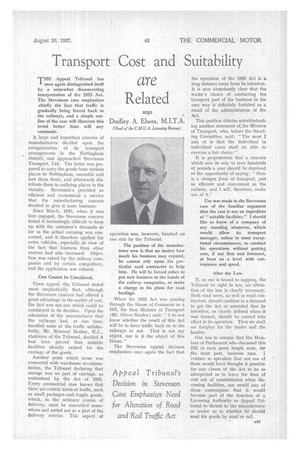Transport Cost and Suitability are Related
Page 41

If you've noticed an error in this article please click here to report it so we can fix it.
says Dudley A. Elwes, M.I.T.A.
(Head of the C.M.U.A. Licensing Bureau)
HE Appeal Tribunal has I once again distinguished itself by a somewhat disconcerting interpretation of the 1933. Act. The Stevenson case emphasizes chiefly the fact that traffic is gradually being forced back to the railways, and a simple outline of the case will illustrate this trend better than will any comment.
A large and important concern of manufacturers decided upon the reorganization of its transport arrangements in the Nottingham district, and approached Stevenson Transport, Ltd. The latter was prepared to carry the goods from various places to Nottingham, assemble and sort them there, and 'afterwards distribute them to outlying places in the vicinity. Stevenson's provided so efficient and economical a service that the manufacturing concern decided to give it more business.
Since March, 1935, when it was first engaged, the Stevenson concern found it increasingly difficult to keep up with the customer's demands so far as the actual carrying was concerned, and it therefore applied for extra vehicles, especially in view of the fact that business from other sources had also increased. Objection was raised by the railway companies and by certain competitors, and the application was refused.
Cost Cannot be Considered.
Upon appeal, the Tribunal stated most emphatically that, although the Stevenson concern had offered a great advantage in the matter of cost, the fact was not one which could be considered in its decision. Upon the admission of the manufacturer that the railways had, at one time, handled some of the traffic satisfactorily, Mr. Rowand Harker, K.C., chairman of the Tribunal, decided it had been proved that suitable facilities already existed for the carriage of the goods.
Another point which arose was connected with warehouse accommodation, the Tribunal declaring that storage was no part of carriage, as understood by the Act of 1933. Every commercial man knows that there are certain kinds of traffic, such as small packages and fragile goods, which, in the ordinary course of delivery, must be assembled somewhere and sorted out as a part of the delivery service. This aspect of operation was, however, brushed on one side by the Tribunal.
The position of the manufacturer now is that no matter how much his business may expand, he cannot rely upon his particular road contractor to help him. He will be forced either to put new business in the hands of the railway companies, or make a change in his plans for road haulage.
When the 1933 Act was passing through the House of Commons as a Bill, the then Minister of Transport (Mr. Oliver Stanley) said : "I do not know whether the result of this Act will be to force traffic back on to the railways or not. That is not my object, nor is it the object of this House."
The Stevenson appeal decision emphasizes once again the fact that
the operation of the 1033 Act is a long distance away from its intention. It is now abundantly clear that the trader's choice of conducting the transport part of his business in his own way is definitely forfeited as a result of the administration of the Act.
This position obtains notwithstanding another statement of.the Minister of Transport, who, before the Standing Committee, said : "The most I aim at is that the individual in individual cases shall be able to exercise a fair choice."
It is preposterous that a concern which sees its way to save hundreds of pounds a year should be deprived of the opportunity of saying : "Here is a cheaper form of transport, just as efficient and convenient as the railway, and I will, therefore, make use of it." • Use was made in the Stevenson case of the familiar argument that the cost is not an ingredient of "suitable facilities." I should like to know of a company of any standing whatever, which would allow its transport manager, unless in most exceptional circumstances, to conduct his operations without putting cost, if not first and foremost, at least on a level with convenience and speed.
Alter the Law.
If, as one is bound to suppose, the Tribunal be right in law, an alteration of the law is clearly necessary. Both road users, as well as road contractors, should combine in a demand to get the Act so amended that its intention, as clearly defined when it was framed, should be carried into effect in its operation. Then we shall see fairplay for the trader and the haulier.
One has to assume that the Members of Parliament who discussed this Bill at such great length were, for the most part, business men, venture to speculate that not one of them would have thought it possible for any clause of the Act to be so interpreted as to leave the item of cost out of consideration when discussing facilities, nor would any of them contemplate that it would become part of the function of a Licensing Authority or Appeal Tribunal to dictate to the manufacturer or trader as to whether he should send his goods by road. or rail.




















































































